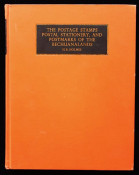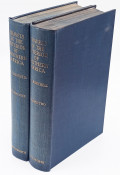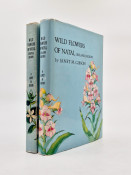First edition: 215 pages, hand coloured frontispiece, 15 engraved plates (including the Castle and the Parade in Cape Town) – 2 folding, recent three quarter grey cloth and marbled paper sides, without titling, edges uncut, a very good copy.
Cape of Good Hope pages 174 -180
St. Helena pages 180 -182
(https://en.wikipedia.org/wiki/Maria_Graham) 'Maria Graham (née Dundas; 19 July 1785 – 21 November 1842) later Maria, Lady Callcott, was a British writer of travel books and children's books, and also an accomplished illustrator. She was born near Cockermouth in Cumberland as Maria Dundas, and didn't see much of her father during her childhood and teenage years, as he was one of the many naval officers that the Scottish Dundas clan has raised through the years.'
'In 1808 when his sea-fighting years were over, her father took an appointment as head of the naval works at the British East India Company's dockyard in Bombay. When he went out to India he brought his now 23-year-old daughter along. During the long trip Maria Dundas fell in love with a young Scottish naval officer aboard, Thomas Graham, third son to Robert Graham, the last Laird of Fintry. They married in India in 1809. In 1811, the young couple returned to England, where Graham published her first book, Journal of a Residence in India, followed soon afterwards by Letters on India. A few years later her father was appointed commissioner of the naval dockyard in Cape Town, where he died in 1814, aged 58, having been promoted rear-admiral just two months earlier.'
Oxford Dictionary of National Biography, Callcott [née Dundas; other married name Graham], Maria, Lady Callcott (1785–1842 (https://doi.org/10.1093/ref:odnb/4399)
'In December 1808 Maria Dundas boarded the HMS Cornelia with her sister, her younger brother, and her father, who had been appointed to the commission of the navy in Bombay. She kept a journal of the voyage, which records her pleasure in tasting her first banana, reading Froissart's Chronicles, learning Persian, drawing (many of these sketches are now in the British Museum), and teaching the four youngest midshipmen. Among the passengers was Lieutenant Thomas Graham, with whom she fell in love while they were reading together the somewhat unromantic works of Tacitus and Dugald Stewart's Philosophy of the Human Mind. They were engaged when the ship docked in Bombay in May 1809, and were married on 9 December 1809.
Over the next two years Maria Graham travelled fairly widely in south and east India, sometimes with her husband, staying in Madras, Calcutta, and Ceylon, and developing a keen interest in Indian culture, religion, and antiquities. After her return to England in February 1811 she seems to have lived in London, where she became acquainted with the Murrays. They were not, however, the publishers of her Journal of a Residence in India (1812), a work intended to perform the 'humble but useful office' of supplementing more learned and specialized accounts of the continent (preface, iv). Covering everything from flora and wildlife to Parsi theology and the daily routine of the Madras lady, it is a lively account of her stay in India, and includes extensive descriptions and illustrations of her visits to the cave temples of Elephanta, Carli, and Canary, and the ancient city of Maliaballipooram. In this work and her subsequent Letters from India (1814) she became a popular exponent of the scholarly work of orientalists such as Sir William Jones, explaining and celebrating Hindu culture and achievements and attempting to put them within the context of the ancient world and European culture: she compares suttee, for instance, to ancient Greek customs. Although not uncritical of the Indian way of life, she was appreciative and open-minded: an approach which was to become increasingly less apparent as evangelicalism and utilitarianism impacted on attitudes to India in the 1830s and 1840s.'
- Size: 4to (270 x220mm)
- Sold By: Clarke's Africana & Rare Books
- Contact Person: Paul Mills
- Country: South Africa
- Email: [email protected]
- Telephone: 021 794 0600
- Preferred Payment Methods: Visa & Mastercard via PayGate secure links and Bank transfers.
- Trade Associations: ABA - ILAB, SABDA

Similar lots in the current auction View all
Click on an item to view more details and to bid.
























